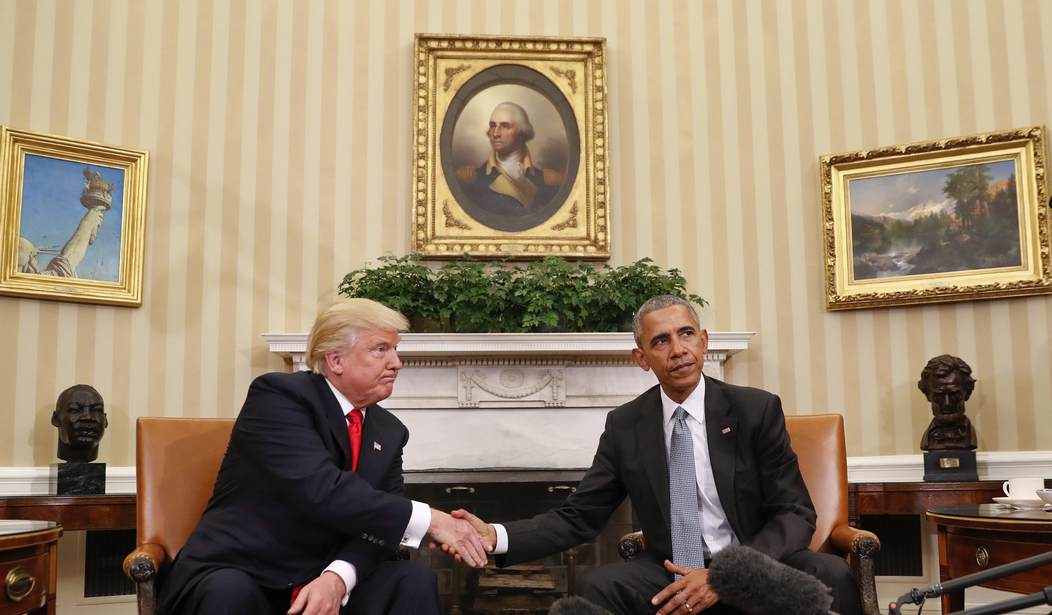Now that we have learned CIA director and secretary of State nominee Mike Pompeo met with Kim Jung Un over Easter, it is time to acknowledge the obvious: the foreign policy of political novice Donald Trump has been vastly more successful that that of the supposedly experienced Barack Obama.
And vastly is an understatement. Obama’s foreign policy was a disaster, beginning with the peculiar apology tour that mystified much of its Middle Eastern audience, through the yet more peculiar (misspelled) reset button with Russia that further mystified Sergei Lavrov, on to Obama’s overheard whisper to Medvedev telling Putin he would be more accommodating on missile defense after the election (imagine the apoplectic reaction of our media if Trump did that!), to the Libyan war leading to the assassination of Qaddafi (the only Arab leader to voluntarily denuclearize) that created a failed state and a raft of refugees to Italy and elsewhere, and, of course, the rapid exit from Iraq that gave rise to ISIS.
And this omits the equally egregious examples — the failure to enforce the red line on Assad’s use of chemical weapons, about which he naively believed Putin, and the never-signed, never-published Iran Deal itself, which has done nothing but enrich the mullahs who wreak havoc from Venezuela to Yemen. This duplicitous and unverifiable non-agreement prolonged the monstrous Syrian civil war, causing the greatest refugee crisis since World War II and changing the character of Europe possibly forever.
There’s more but you get the point. Not even Jimmy Carter had that bad a record. And this is without Obama’s sickening lack of response to the freedom demonstrators in Iran. (“Obama, Obama, are you with us or are you with them?” Well, we know.)
And Trump?
To begin with, there’s the near-annihilation of ISIS. Then there’s the renewed alliance with Saudi Arabia and the Gulf states without, miracle of miracles, the ostracism of Israel. Indeed, while announcing the move of the U.S. embassy to Jerusalem (with little protest by ME standards), the Israeli-Saudi alliance has flourished. Does this mean an solution to the Israeli-Palestinian problem is imminent? Probably not. But at least the decades of moribund unchanging policy since Oslo have finally been bypassed and new perspectives made possible.
He has also so far managed the Syrian gas attacks with an intelligent level of response, escalating it carefully.
And then there is the North Korea situation. Not one American president made a dent in it. There are no guarantees, but Trump seems to be on the brink of…. something. It’s exciting to watch because there is actually a possibility of real peace in a part of the world that has not seen it in well over half a century. Trump, the peacemaker, balancing North Korea, South Korea, China and Japan? Who would have thought it? Not our media. They hate him so much if he cured cancer they would think it was a trick — or a clever way to sabotage Obamacare.
The so-called trade war is a part of foreign policy too. Our media and some of our business people and the knee-jerk political opposition went into paroxysms when Trump threatened tariffs with China. But how else could a rebalancing of our trade with our greatest competitor ever be effectuated? Certainly not by the jawing of stodgy trade officials who have been at it for decades with no results and little incentive to have any. Now it looks as if it may succeed. (What’s surprising is that our media didn’t get what Trump was up to in the first place, negotiating. Scratch that. They probably did. They just couldn’t stand it because it was Donald doing it. That’s how stunted they are.)
But what accounts for this great difference between Trump and Obama in foreign policy and the closely related trade negotiations? It could come down to something as simple as this. Trump may have read a tiny bit of Marx at school, but I doubt he paid very much attention to it or even remembered it. It seemed useless to him — it wouldn’t help him build a single hotel. Obama read it and believed it, with “modern” reservations. Those reservations, however, were never strong because alternatives (Adam Smith, Milton Friedman, etc.) felt uncomfortable to him and, more importantly, not useful to his personal advancement whether in the academy or in the wards of Chicago. So the Marxism remained as part of his credo, though never mentioned, except perhaps to the most trusted friends. Sometimes he didn’t even admit it to himself. Truth, from the beginning, had to take a second place for Obama. Adhering to economic reality, actually helping people, ran counter to his own advancement.
For Trump, laissez-faire with all its pluses and minuses ruled. The bottom line was king. What worked worked.
This partly explains Trump’s two-tiered approach — criticizing a country’s actions while seemingly being softer or even too soft on their leaders (Putin, Xi). The president wants to get things done and realizes, from business, that is the effective way. You might insult the leader for a while, as he did with Kim, but eventually you stop in order to get your way. You don’t alienate the boss who has to make the final decision or it won’t get made — unless you want to completely annihilate him, but Trump, despite what his critics says, has not indicated that he does. In fact, the reverse is true. Consequently, Trump, as he has demonstrated, has little use for ideology or even consistency. In a constantly changing world, he may be right. Those who are looking for some sort of Trump Doctrine may be looking for something that is actually outmoded. So far he is being more successful than Obama and all the neo-Marxist works of Marcuse, Gramsci, etc. combined.
Roger L. Simon is an award-winning novelist, Academy Award-nominated screenwriter and co-founder of PJ Media. His latest book is I Know Best: How Moral Narcissism Is Destroying Our Republic, If It Hasn’t Already. He tweets until he’s blacklisted @rogerlsimon.









Join the conversation as a VIP Member